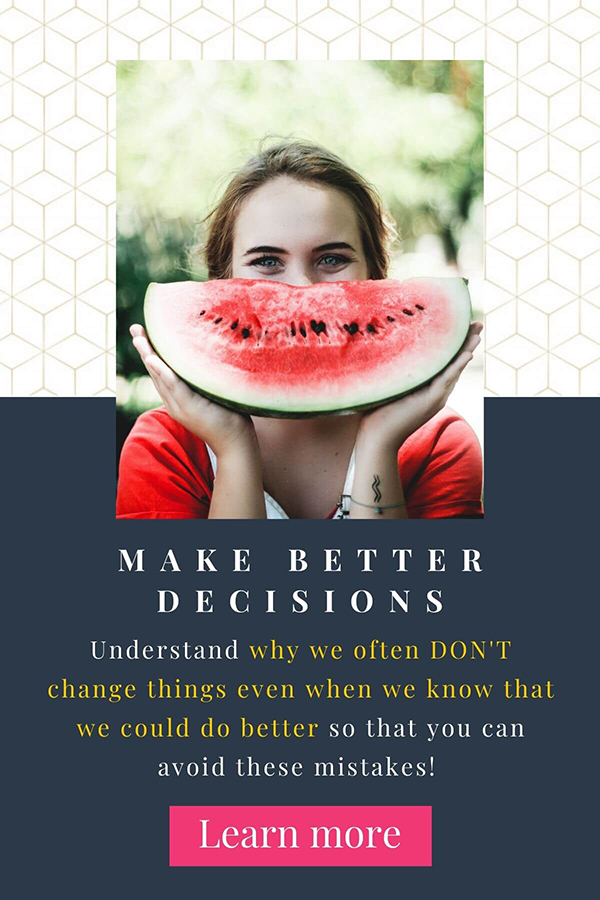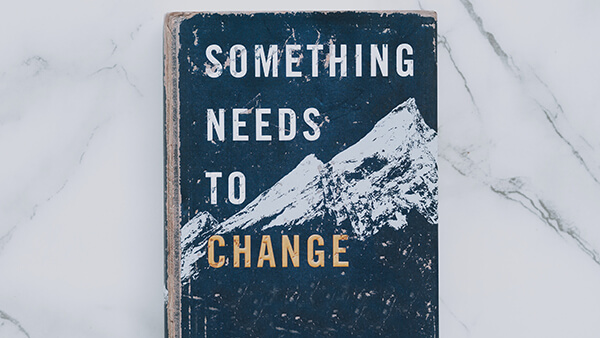If humans were always behaving rationally, this simply wouldn’t happen. I mean, who in their right mind would opt for second best or worse?
Well, we all do. We all waste money, time, and energy in all areas of our lives on things that don’t serve us anymore.
It can be little things like keeping a subscription to a magazine you never read. Or a membership to a gym you never use.
Or big things like not investing in your business to get ahead or staying in a relationship that doesn’t make you happy.
Raise your hand if you’ve done any of those! I have.
Yet it doesn’t make sense – so why do we do this?

The resistance to change
In the end it all comes down to 2 reasons:
Reason #1: It’s familiar. Remember, your subconscious mind loves everything that’s familiar! Your subconscious is primarily concerned with keeping you safe. Yes, your circumstances might not be great, but at least you haven’t died so that has to count for something.
Reason #2: It’s comfortable. All you need to do is – well, nothing! That’s neat! Your brain doesn’t need to burn any extra calories thinking about alternatives and taking action. Conscious thinking and decision-making are highly energy-demanding processes and your brain is doing a great job trying to conserve its energy.
Choice overload
If you’ve ever found yourself in a supermarket in front of a huge shelf of, say, body lotion, and you were completely overwhelmed by choice, you know what I’m talking about.
Yes, maybe there’s a new product that would be much better for your skin, but MAN – there are just too many to compare! Even if you narrow your choice down to products for dry skin, is avocado oil better than Moroccan argan oil? What brand should we choose? Do we want the latest nanotechnology or simple organic ingredients?
The brain can’t handle comparing too many different choices, especially if you don’t know which criteria should form the basis of our choice.
So chances are you leave with the same product you already know. Or – if they don’t have it – leave empty handed.
That’s not uncommon. We often default to “When in doubt, do nothing.”.
Status quo bias
In behavioral sciences, our tendency to stick with the familiar is often called the “status quo bias” and one of its driving forces is that making decisions is such a complex problem.
It’s easier to make decisions based on a limited number of items and criteria. For example, if all you have to choose is an ice-cream flavor and you can only choose between chocolate and vanilla, that should be fairly easy.
But when you have to decide decide between an ice-cream, a milkshake, frozen yogurt, or cake and 20 different exotic flavors, half of which you’ve never heard of before, even those trivial decisions can become too much and leave us feeling overwhelmed.
So in general, choice overload combined with high uncertainty often leads to keeping us stuck with the status quo.
Therefore, a great tip to help you overcome this bias and to choose options that suit you better, is to reduce the number of choices and to narrow down your options.
Loss aversion
Another important aspect when we’re contemplating WHY we don’t change certain things even though we’re not happy with them, is loss aversion.
Loss aversion basically means that we don’t like to give up something we already have. Even if we didn’t really need or want it in the first place.
That’s why so many companies offer free trials – they know that even when you weren’t convinced in the beginning – once you start using their products or services, you don’t want to give them up again.
It might not be great, but it’s yours. So you want to keep it.
Cognitive dissonance
And something else is going on if we look at bigger decisions than choosing ice-cream flavors. Let’s say your career pathway or your marriage.
You’ve put a lot of time, money and effort into those, right? You’ve made a commitment. You have invested so much – so you try to make it work at all costs. Acting against those commitments creates cognitive dissonance and makes you feel torn, so you don’t want to do it.
This is certainly something I’m very familiar with. As you might know, I’ve spent more than 10 years studying biology, teaching, and doing research and then even though I wasn’t too happy with doing lab work all day long, I felt that I was somehow stuck with this commitment because I had already invested so much time, money, and energy into following this career path.
It took a lot of inner work to overcome this and find alternative ways to move forward. So this is certainly something to look out for when you feel stuck. If you’re currently doing something you don’t enjoy or you are not passionate about – let me tell you that you can ALWAYS change this, no matter how much you’ve already invested.
It’s always better to change direction than to keep moving in the wrong direction, right?
I know those are tough decisions to make though.
Avoiding regret
And moreover, you always try to avoid regret, right? What if you make a big decision and things go south? Research has shown that people feel more regret for undesired outcomes that result from NEW actions than for bad consequences that result from their inaction.
So that’s another reason why it’s so hard to make tough choices.
Now, usually when we avoid important choices, we don’t sit down and ask ourselves what’s going on here. These things happen unconsciously. But now that you know what’s going on, you can become aware of them, if you pay attention!
So why is it so hard for you right now to make that decision you know you should be making? What’s going on?
As always, I would love to read your thoughts and comments!
Wondering how to get started building your dream life?
Here's your Dream Life Architecture Plan:
1. Schedule your FREE 20min Strategy Session.
2. Create a customised plan for achieving your goals.
3. Implement your plan and build your dream life.

